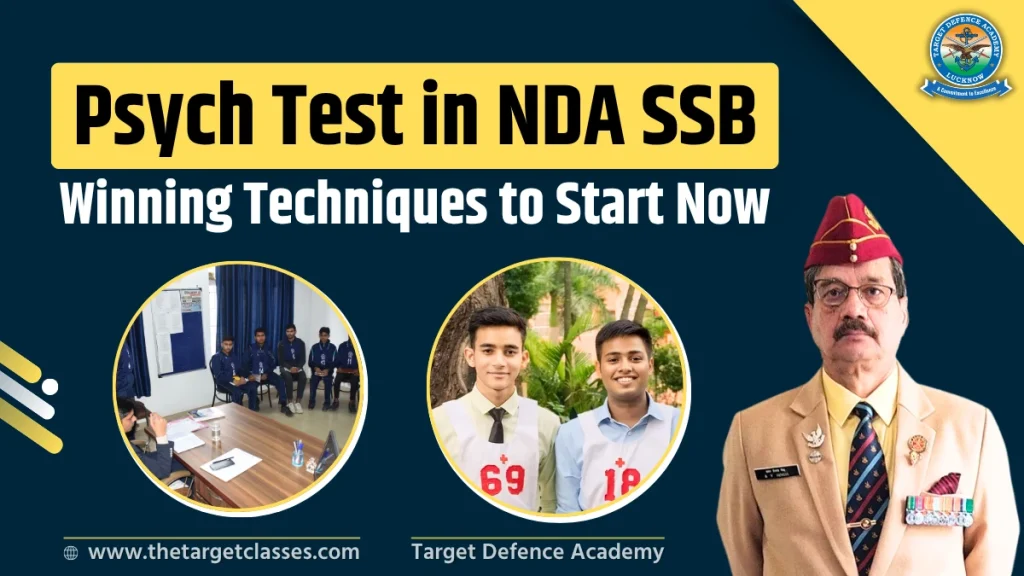Psychological assessments at NDA SSB are designed to explore your inner psyche, character, and suitability for military leadership. With targeted practice and the right mindset, you can gain an edge – and this guide ‘Psych Test in NDA SSB’ shows you how.
1. Overview of NDA Psych Battery
Psych tests are a vital part of the Stage I assessment, held after initial screening. You’ll face four tests:
- TAT (Thematic Apperception Test): Story based on ambiguous pictures
- WAT (Word Association Test): Rapid responses to given words
- SRT (Situation Reaction Test): Write reactions to daily situations
- PSI (Personal Data Inventory): Questionnaire probing past behavior
Each test is scored and contributes to selection clarity. Consistency and truthfulness are essential.

2. TAT – Reveal Your Inner Leader
Goal: Show the way you deal with challenges, leadership, teamwork, ethics.
Winning Techniques:
- Observe each picture for 30 seconds
- Frame a 3-part story: Setup → Challenge → Resolution with action
- Lead through adversity; highlight initiative, responsibility
- Practice daily with 20 varied TAT images
3. WAT – Snap Responses, Strong Mind
Goal: Measures instinctive associations and mental agility.
Winning Techniques:
- Respond within 15 seconds – stay positive, socially acceptable
- Prepare 200 strong words in advance (e.g., “discipline” → “respect”)
- Keep responses one or two words to show decisiveness
- Watch for negative wording – avoid them
4. SRT – Real-World Reaction Skills
Goal: Assess decision-making, integrity, empathy under pressure.
Winning Techniques:
- Practice 100 scenario prompts beforehand
- Split reply in 3 lines: Situation + Action + Outcome
- Show empathy for others, responsibility, quick thinking
- Keep answers precise – 40–50 words max
SSB Dossier Psychology Test: The Ultimate Guide
SSB Interview Preparation Blueprint: Easily Pass the SSB with Confidence
Download the Mobile App of Target Defence Academy
5. PSI – Consistency Check
Goal: Match your written personality to test responses and SSB interview behavior.
Winning Techniques:
- Answer honestly – avoid extremes – choose mid-range options
- Review your application form; avoid contradictions
- Practice by simulating test dynamics
6. Scoring & Evaluation
- TAT/WAT/SRT graded on clarity, attitude, values, emotional maturity
- PSI acts as cross-check across test answers and personal data
- Consistency is key; mixed messaging can cost you
7. 30-Day Prep Blueprint
| Week | Focus Area |
| 1 | Learn formats, practice 10 TAT images |
| 2 | WAT & SRT twice daily, build response bank |
| 3 | PSI simulations + review other test answers |
| 4 | Full mock battery daily + feedback review |
8. Additional Tips
- Journal reflections after each practice to refine
- Engage a mentor or group for feedback
- Work on handwriting – legibility matters
- Stay calm, well-rested, and focused during tests
Conclusion
Psych Test in NDA SSB isn’t about memorization – they’re about showcasing your true character under structured formats. Follow the 30-day plan, be honest, introspective and disciplined. Start now, track progress and enter NDA SSB with confidence.
FAQs about Psych Test in NDA SSB
Ans. The Psych Tests include Thematic Apperception Test (TAT), Word Association Test (WAT), Situation Reaction Test (SRT), and Self-Description Test (SD).
Ans. They consider your officer-like qualities (OLQs), including decision -making, personality symptoms, attitudes and subconscious behavior, which are important to military leadership.
Ans. Practice writing clear, positive and action -oriented stories within 4 minutes, depending on the various image signals. Be aware of showing leadership and problems.
Ans. In less than 15 seconds, you develop a habit of creating a fast, meaningful and optimistic phrases with words in less than 15 seconds. Practice a timer to build speed and clarity.
Ans. Read the situation quickly, answer with practical, self -confidence and moral functions, and try to complete at least 40-45 out of 60 at the given time.
Ans. This detects your self -awareness and stability with other tests. Depending on what you think of your parents, teachers and friends, you create truth and balanced answers based on it – and your own analysis.
Ans. Coaching can guide you with frames and practice kits, but real success comes from real personality development and introspection.
Ans. Start at least 2–3 months before your SSB, focusing daily on writing and reviewing your responses to develop natural and consistent thinking.
Ans. Yes, a trained psychologist evaluates your performance independently, and your result depends on overall personality coherence, not individual test scores.
Ans. Avoid fake or idealistic responses. Be realistic, positive, and honest, as inconsistency or unnatural answers are easily spotted by assessors.

